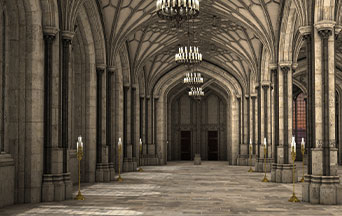
The existence of a conspiracy against the Ultramontane editor, Louis Veuillot, and his newspaper l’Univers became increasingly evident during the early 1850s.
An important factor was the publication of Alfred, the Count de Falloux’s book, The Catholic Party—What it Was and What it Has Become. Perhaps even more apparent was the promotion and circulation of the anonymous pamphlet L’Univers jugé par lui-même (The Universe in its Own Words). Indeed, the pamphlet’s preface declared it to be the work of several authors.
The general opinion indicated Bishop Felix Dupanloup of Orléans as the campaign’s mastermind. That assumption was fully confirmed when L’Ami de la réligion, a newspaper that always echoed the bishop’s opinions, insisted on praising the pamphlet. That journal amplified the pamphlet’s accusations, even after several other bishops had publicly supported l’Univers.
With the passage of time, no one can unequivocally demonstrate Bishop Dupanloup’s active participation in the publication of L’Univers jugé par lui-même. However, its anonymous “authors” copied almost verbatim one of the Bishop of Orléans’s still unpublished letters. The tone of these missives was so forceful that they were often referred to as “commandments.” He never issued any protest, showing at least a tacit approval of the pamphlet.
Eternal and Natural Law: The Foundation of Morals and Law
The “commandment” in question dates from 1853. At that point, liberals expected a pronouncement from the Holy See answering the question the Archbishop of Paris raised about closing l’Univers. Bishop Dupanloup prepared the letter condemning the newspaper in haste. That document was simultaneously printed in Orléans and the Paris workshops of L’Ami de la réligion. However, Pope Pius IX’s encyclical Inter multiplices and the archbishop of Paris’s submission made the letter pointless. Bishop Dupanloup ordered its destruction. However, the publishers of L’Ami de la réligion did not carry out that order in the Paris workshop where part of the “commandment” had already been printed. This was, perhaps, the copy quoted in L’Univers jugé par lui-même.
Ultimately, the episcopal approvals of l’Univers, Veuillot’s articles exposing the pamphlet’s bad faith, and proof that some cited passages were adulterated were of no avail. The campaign continued. Apparently, its promoters, sure of liberal support, thought this confusion could still strike a death blow to l’Univers.
Seeing no other option, Louis Veuillot decided to sue the booklet’s anonymous editor. This move frightened his opponents. They argued that Veuillot was breaking the rules of journalism. Since writers have a natural platform to defend themselves, they criticized Veuillot’s resort to the justice system.
Veuillot replied that he had always known who his adversaries were in earlier battles. He was unwilling to fight anonymous attackers. On the other hand, if the Archbishop of Paris ordered him to suspend the lawsuit, he would immediately do so out of obedience. When the Nuncio and other bishops asked him about it, Archbishop Sibour became irritated and refused to intervene.
The lawsuit continued. To escape responsibility, Dentu, the publisher, forced Father Cognat of L’Ami de la réligion, one of the “many” authors, to declare himself.
The sad sight of a priest taken to court led l’Univers to seek a settlement. Louis Veuillot and a supporter, Bishop Pierre-Louis Parisis of Arras, asked the archbishop of Paris to intervene. They proposed that Father Cognat publish a note to be signed by both parties.
 Learn All About the Prophecies of Our Lady of Good Success About Our Times
Learn All About the Prophecies of Our Lady of Good Success About Our Times
“The brochure titled L’Univers jugé par lui-même will not be reprinted. The editors of l’Univers withdraw their complaint and agree to no longer deal with the matter in their newspaper. They reserve only the right to publish a volume of simple documents.”
The archbishop of Paris found the note acceptable but still refused to intervene. A lay Catholic of some renown, M. Marzion, presented himself as an intermediary. He proposed that l’Univers publish two notes. The first, signed by Father Cognat, would read:
“I did not intend to say anything insulting against the editors of l’Univers, and I declare myself ready to satisfy all legitimate complaints, whether against the meaning I believed I could attribute to certain texts or against specific assessments made.”
The second note, to be signed by l’Univers, was as follows:
“Since Father Cognat has declared he did not intend to say anything insulting against the newspaper’s editors and is ready to satisfy all legitimate complaints, we now must deal with the matter between us, there being no further reason to defer it to the courts.”
Veuillot accepted this compromise, except that he proposed that l’Univers publish this note instead:
“[Father Cognat’s] statement leaves no room for a lawsuit. Nevertheless, the editors of l’Univers, and especially its editor-in-chief, declare that their case did not aim to obtain satisfaction for insults but only to ascertain the nature of the texts drawn from the paper. This verification will be made in a compilation which will be published later.”
10 Razones Por las Cuales el “Matrimonio” Homosexual es Dañino y tiene que Ser Desaprobado
The above notes were to be inserted both in l’Univers and L’Ami de la réligion on the same day and without comment. L’Univers published them on the appointed date. Even though Father Cognat had declared that he accepted the conditions, L’Ami de la réligion only published it three days later. Accompanying the note was an article by Father Sisson that ended thus: “L’Univers will endeavor to justify the texts which the brochure’s author drew from the newspaper’s collection. For his part, the author of the brochure will have to modify his work according to the claims it deems legitimate.”
Of course, l’Univers had not intended to provide any such “justification.” To do so would imply acceptance of a responsibility that belonged to the pamphlet’s “authors.” The article by Father Sisson clearly violated the spirit of the compromise. Therefore, despite Veuillot’s wishes and efforts, peace was impossible. The lawsuit continued.
Photo Credit: © Veronika – stock.adobe.com

